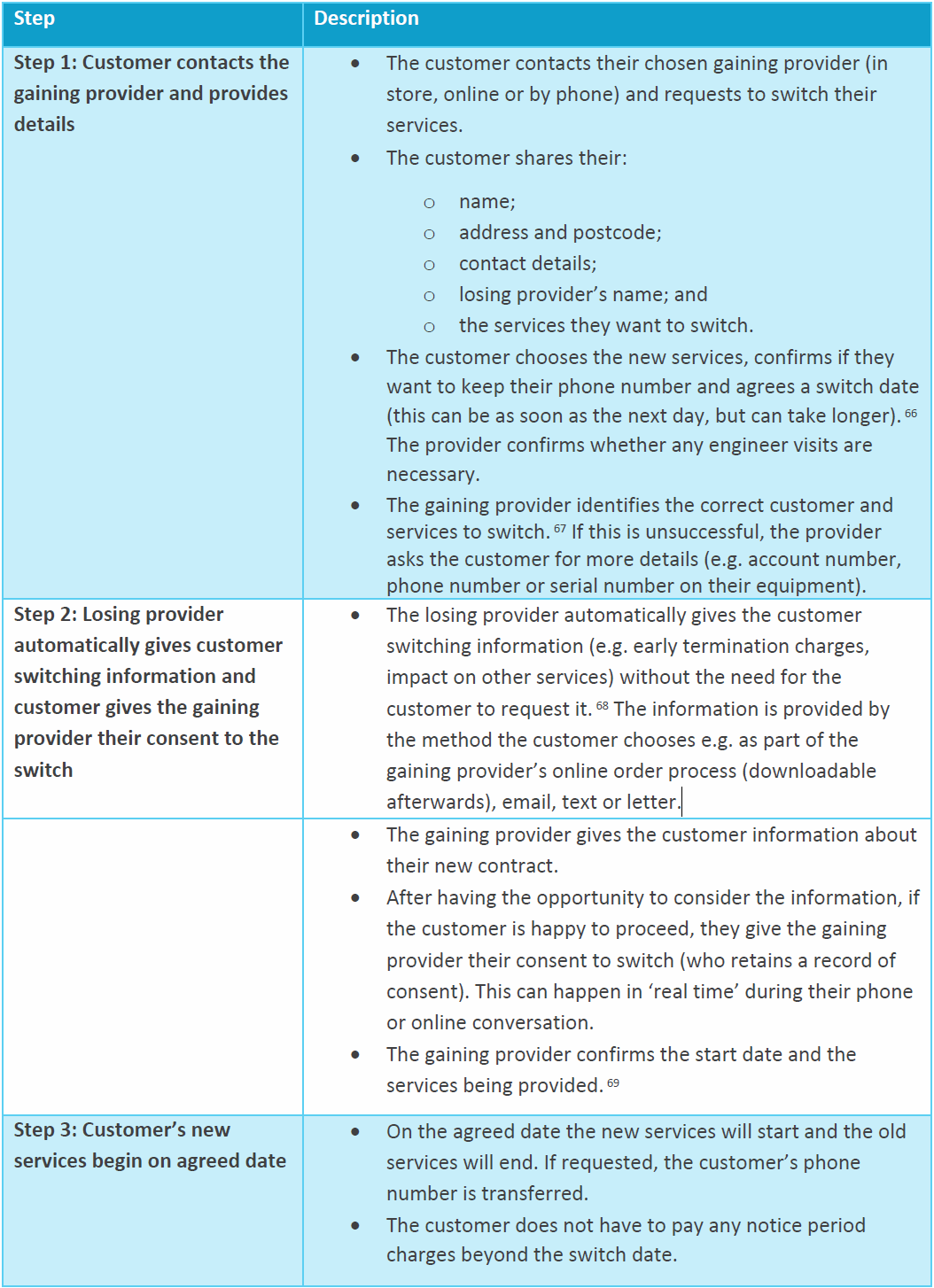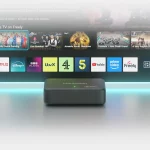Ofcom Details New UK Broadband ISP Switching Process for 2022

As expected the UK telecoms regulator has today published detailed proposals for a new simpler “one touch” switching process for all broadband customers, which from December 2022 will make it easier for consumers to switch between ISPs on physically separate networks (e.g. Openreach’s full fibre to Cityfibre or Virgin Media etc.).
The planned changes were formally confirmed in Ofcom’s October 2020 statement (here), which covered their implementation plans for the new European Electronic Communications Code (EECC). However, this only set out a broad overview of what they planned to do, while the exact details were left until today.
At present switching between ISPs on Openreach’s (BT) national network is an easy and largely automated Gaining Provider Led (GPL) process (i.e. just contact your new ISP and they’ll get the ball rolling), but the rapid rise in new alternative network ISPs (plus Virgin Media) – particularly full fibre (FTTP) providers like Cityfibre, G.Network and many others (see our ‘Summary of Full Fibre Build Progress‘) – has created new challenges.
Advertisement
Sadly, customers who want to switch between physically separate networks often have to take the manual cancellation route (i.e. order the new service and then contact your old ISP to cancel), which can result in longer periods of downtime (perfect coordination is difficult) and greater uncertainty for consumers. Some customers can also find themselves stuck paying for two services at once, even if only one is usable, but this rarely lasts long.
Ofcom’s solution essentially involves extending the existing GPL process to work across these different networks, which is a technically difficult thing to get right.
The New Broadband Switching Process
Under the changes Ofcom states that any “loss of service” that might occur during a switch must NOT be allowed to exceed 1 working day (“if technically possible“) and ISPs will be expected to compensate customers if things go wrong. The regulator has also banned notice period charges beyond the switch date for residential customers, which should prevent situations where a customer ends up paying for two services at the same time.
Meanwhile the losing provider will be required to continue to supply the end-user on the same terms, until the new service is activated by the gaining provider, and to automatically terminate end-users’ contracts upon conclusion of the switching process. The losing ISP will also be required to reactivate the number and all related services where a switching process fails and until the port is successful.
Advertisement
Step by Step – One Touch Switch (Ofcom’s Preferred Approach)
1. A customer would contact their chosen new provider and give their details.
2. The customer would then automatically receive important information from their current provider. This would include any early contract termination charges they may have to pay, and how the switch may affect other services the customer has with the company.
3. If the customer wants to go ahead, the new provider would then manage the switch.
However, a second Code to Switch process is also optionally proposed for consideration, although Ofcom doesn’t believe this meets all of their criteria and we can see why (it’s not as simple and risks customers being pressured to stay). Under this process a customer must first contact their current ISP by app, online or phone to get information about the implications of switching as well as a switching code. If they decide they want to go ahead with the switch after considering the information, they contact the new provider and give them the switching code. The new provider then manages the switch.
Lindsey Fussell, Ofcom’s Networks and Communications Group Director, said:
“There are lots of different offers out there from a wide range of broadband and landline providers. And we want to make it even easier for people to get a better deal or upgrade to a faster, more reliable service.
We know some customers can be put off by the hassle of having to deal with more than one provider when trying to switch. So our proposals today aim to make the process as seamless as possible, for everyone.”
Mark Shurmer, Openreach’s MD of Regulatory Affairs, said:
“We already manage around 175,000 switches every month between providers on the Openreach network and that process is designed to be very straightforward for customers.
We support Ofcom’s ambition to make switching between different network providers equally simple.
We believe that any solution for cross-platform switching needs to be really simple for consumers and businesses and we’ll be responding to the consultation with that in mind.”
In keeping with all this the regulator will also be making some “limited” changes to phone number porting, which includes giving customers the “right to port their number for one month after they have terminated their contract and a prohibition on charging customers to port their number.” This should be a big help as at present it can be quite tedious to get your number back if it’s lost during a switch.
Ofcom are clearly making significant changes to how switching processes work and as such, the new rules are NOT expected to come into force until December 2022. The move will certainly give alternative network (AltNet) ISPs something to think about, particularly as until now most of them won’t have had to deal too much with complex regulatory matters and process requirements, beyond the basics.
We should point out that this new process is for residential customers only, which Ofcom states is because “business and residential customers can sometimes have different needs when switching and that there is diversity among business which means it may not be appropriate to specify certain rules that would apply to all business customers in the same way as to residential customers.”
Advertisement
Finally, the regulator also proposes improving the information providers must give to customers who are considering switching their mobile phone service. From December 2022, the current operator would need to tell customers about the impact of the switch on other services they have with the provider. This would include any bundled services or specific services for disabled customers. This will help customers understand the implications of switching so they can make informed decisions about whether to switch
Today’s consultation (see link at the bottom) will close on 31st March 2021, and Ofcom then aim to publish their decision in the summer 2021. We’ve also pasted more details of how the One Touch Switch process will work below.
One Touch Switch Process (Detailed)

Ofcom’s 2021 Switching Consultation
https://www.ofcom.org.uk/../simpler-broadband-switching
UPDATE 12:52pm
Added a comment from INCA below, which represents many alternative network ISPs.
INCA Chief Executive, Malcolm Corbett, said:
“INCA has played an important and active role on behalf of the independent sector throughout the consultation process with OTA2 and Ofcom and will continue to do so as Ofcom consults on their preferred option of “One Touch Switch” to issue a final decision in Q2 this year.
Broadband providers now have less than 2 years to implement new, compliant switching processes. We would urge all members to ensure their views are represented during this vital period”.
UPDATE 4:39pm
Rural ISP Gigaclear has also added a comment.
Gareth Williams, CEO at Gigaclear, said:
“We’re very pleased to see that Ofcom is consulting on changes to the fixed line switching process.
Ultimately switching providers is a matter of consumer choice and a model where the process is completely led by the new supplier removes a huge barrier for people trying to get the best deal available to them. To require some form of switching code or permission from your existing provider diminishes these benefits.
Gigaclear will respond to the consultation to express this view and we’re looking forward to working with both Ofcom and our peers in the industry to progress this work.”
Mark is a professional technology writer, IT consultant and computer engineer from Dorset (England), he also founded ISPreview in 1999 and enjoys analysing the latest telecoms and broadband developments. Find me on X (Twitter), Mastodon, Facebook, BlueSky, Threads.net and Linkedin.
« Virgin Media UK Offer Laptops and Mobile Data to Disadvantaged Kids
BT Group Build 1Gb FTTP Broadband to 4.1 Million UK Premises »























































I find it amusing.
Calling the ISP you want to move to is kinda all you have to do.
Maybe call you current ISP to let them know you’re leaving too.
But that is no problem.
Of course from/to Openreach to Virgin Media both need to be contacted. I don’t see how people can find that so inconvenient!
It’s only two calls.
We are typically lazy & just want things done.
I see it like this, if one chooses to stay with current ISP & not move to another better one then they must be happy to continue as they are.
I can see you’ve never spent days trying to get through to someone at an ISP that has no interest in making it easy for you to leave.
@Tom. Yeah I have had some time on the call waiting for someone to answer. No I haven’t experienced multiple days trying to get through.
They try their best way keeping you but if one knows what they want then it can be a short call.
Maybe it’s just me when I go into that conversation I’ve done my homework & tell the old ISP what’s going to happen, not the other way around.
I haven’t had negative experiences myself.
This was a real problem. From memory the original Ofcom MAC process was replaced (around 2015?) as some ISP were not responding timely and preventing customers from leaving. There were many examples of people unable to get a MAC. The replacement process resolved this by having switch initiated by the gaining provider.
A lot of people will be unaware that they want to switch physical networks assuming it’s just like electricity, gas or water. A lot of providers do make it difficult and timely. And TV services/mobile bill subsidies muddy the waters further. Yes, it’s only two calls, but that’s not the point – just like switching bank accounts used to be ‘just contact your employer and everybody with a direct debit set up’. After all, if 1 million people wanted to switch, and got stuck on the phone for just 15 minutes (which I never have with my provider), that’s a lot of time wasted (28+ years).
I’m currently looking to switch, and know that I’m going to either be without a service (taking time off work), or paying for two services (can’t afford to throw much money away). If I had the choice, I’d rather it be as easy as possible. Then providers might be forced to provide better services rather than backloading offers into retentions departments.
@Michael, it is more than that as you need to co-ordinate moving telephone numbers between Virgin and Openreach and need it to happen at the agreed date without downtime of either the phone number or the Internet. Typically the level of service you will receive from the provider you are leaving is a lot worse (which maybe why you are leaving in the first place) than the gaining provider who wants your business, so it makes sense one call to the gaining provider and they organise it.
What about those instances where a provider like Virgin place a port for a set date, get it completed on that date but then go to site to do the work and find out they can’t (blocked ducts/whatever etc).
Under these new proposed changes, the old ISP is expected to restore service which if involving already now ceased services cannot be done as quick as Ofcom seem to expect.
I refer to Virgin as they do this regularly but are not the only ones.
I can see why there is a proposal that a code must be obtained from the departing ISP. There have been cases of fraudulent telcos signing up customers willynilly – infamously one telco called themselves ‘Hold’ and cold-called people saying ‘can I put you on hold?’ …
But at the end of the day that’s a regulatory issue. Fraudulent telcos are a police and Ofcom issue, and the general public shouldn’t have to worry about them or suffer from trying to extract a code from a departing ISP. Keep it simple. Let the new ISP handle all details of the changeover, they’re motivated to do it well. Don’t force customers to get a code from the old ISP.
This is excellent news. I wish it came into effect sooner than December 2022!
> The losing ISP will also be required to reactivate the number and all related services where a switching process fails and until the port is successful.
At whose cost? If the failure is down to the gaining provider why should the old provider be potentially liable for the costs in doing so? For many services, it is not as quick to restart them as it is for them to end.
This. Great from a customer perspective but there are some significant challenges to achieve from the ISP side. The PSTN switch off might help with this longer term!
Obviously the customer will continue paying their usual bill until service is terminated
Also, if ISPs can literally count bytes, which are streaming by in large quantities and at high speed for the purpose of billing users, how is it more complex to activate/reactivate a service?
They have simply never had incentive to make service activation easy/cheap/quick, and the law will give them incentive enough.
@spurple.
The customer paying is irrelevant. The OR costs to restart a VDSL service is approximately £54 and what if it needs to be ceased again, another £30~. Likewise, if relying on Openreach, it can take up a week to (re)activate a service.
If the old provider can’t pass that on to the customer, who then takes it on the chin?
Migrations are 99% in control of the new provider and it is they who should remain responsible just like is expected of the now.
Clearly Ofcom, again, not thinking about the current technical constraints set by infrastructure operators with their customers (the ISP) having to pick up the slack and often, tab.
@matt
All I hear are excuses. From my point of view, activating or deactivating servixis as simple as updating an access control list, so long as the physical equipment hasn’t been removed.
If that’s not how it is, I don’t see a technical reason why it isn’t that way, so that’s the losing ISP’s problem to solve. That goes for OpenReach too.
If they lacked an incentive to optimise the process, now they have one.
@spurple
Specifically re: OR.
You may think that but unless Ofcom force Openreach (and all networks) to provide a quick path to restoration of service, this simply won’t be technically possible.
Hopefully, the consultation will address these issues bit given that the current GPL process, which has allowances for “erroneous transfers” which should mean restoring service is quick, can still take up to 14 days; so something they already have in place doesn’t work I fail to see how a new system will either.
The list of sore losers who make leaving a misery (in my experience) includes at the top:
XLN
Talktalk
BT
Some of their actions are delay tactics, others simply fraudulent with refusal to refund monies owed. In some cases concocting exit fees.
It’s all irrelevant unless FTTP can use a single fibre regardless of the altnet coming into each premises.
Every premise just needs a connector in the street that each altnet then connects to. But of course GPON has never been and will never be fit for purpose.
Only only see a benefit to the consumer if providers also clearly explain all the implications of their change including engineering visits, functionality, voice porting, ISP equipment and service.
ADSL to FTTC
FTTC to HFC
FTTC to FTTP
HFC to FTTP
FTTP to HFC
FTTP to FTTP
WISP to FTTP
Very unlikely, especially with our exaggerated advertising (all).
Be a lot easier if Virgin was made to unbundle its cable to the home then!
I think ofcom have lost the plot on this one.
I tend to agree
It’s a consultation, it’s always more fun if people without a vested interest in the outcome start putting realistic comments into them. Especially as any clear steer in a single direction might actually cause them to wake up.
That said Ofcom might have a populist Chair in the future https://www.theguardian.com/media/2021/jan/31/johnson-poised-to-appoint-paul-dacre-chair-of-ofcom